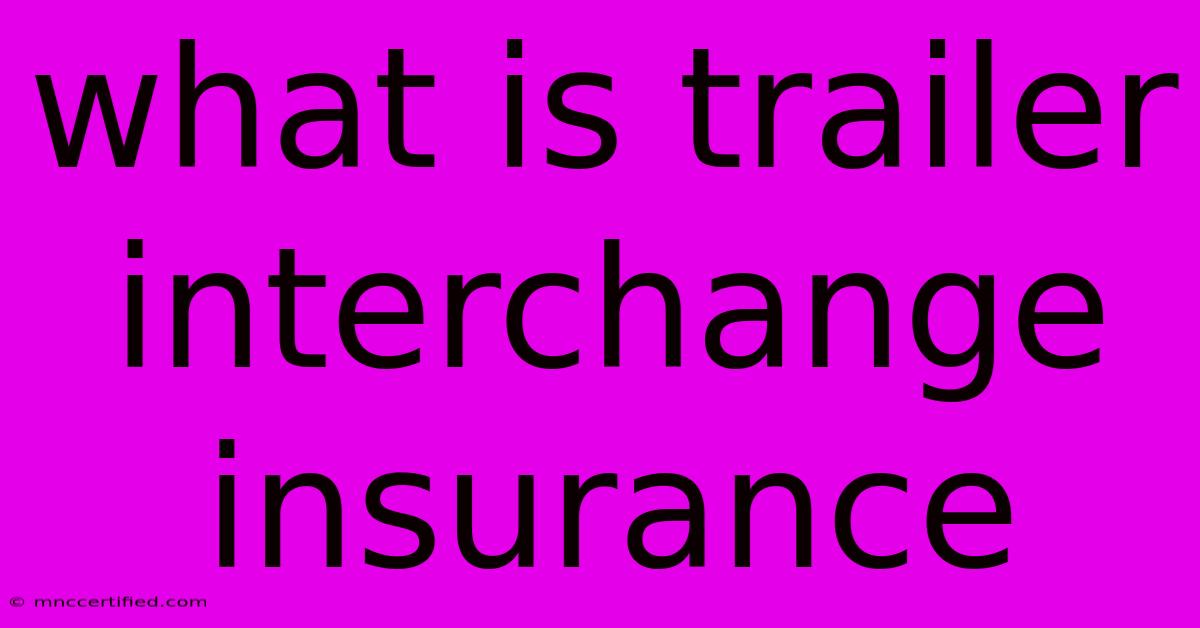What Is Trailer Interchange Insurance

Table of Contents
What is Trailer Interchange Insurance?
Trailer interchange insurance, also known as interchange liability insurance, is a crucial coverage for trucking companies and businesses that lease trailers. This specialized insurance policy protects businesses from financial losses arising from damage or liability issues related to trailers that are exchanged or interchanged between different parties.
Let's delve deeper into the specifics of trailer interchange insurance:
Understanding Trailer Interchange
Trailer interchange is a common practice in the transportation industry. It involves the temporary transfer of a trailer from one party (the "lessor") to another (the "lessee"). The trailer remains the property of the lessor, but the lessee is responsible for its safe operation and maintenance during the interchange period.
Why is Trailer Interchange Insurance Needed?
Trailer interchange comes with its own set of risks. Here's why businesses need trailer interchange insurance:
- Damage to the Trailer: Accidents, wear and tear, or negligence can lead to damage to the trailer during the interchange period. The lessee is typically responsible for any damage they cause, but without adequate insurance, they might not be able to cover the repair costs.
- Liability for Accidents: If the trailer is involved in an accident while in the lessee's possession, the lessee could be held liable for injuries or property damage. Trailer interchange insurance provides coverage for these liabilities.
- Cargo Loss or Damage: The trailer often carries valuable cargo. In case of cargo loss or damage, the lessee might be held responsible for the financial losses incurred by the cargo owner.
Key Coverage Aspects of Trailer Interchange Insurance:
- Physical Damage Coverage: This covers repairs or replacement costs for damage to the trailer caused by accidents, theft, vandalism, fire, or other covered events.
- Liability Coverage: Provides protection against claims for bodily injury or property damage caused by the trailer during the interchange period.
- Cargo Coverage: This coverage protects against financial losses arising from damage to or loss of cargo while the trailer is in transit.
- Deductible: Typically, a deductible is applied to claims, which means the insured party pays a certain amount out of pocket before the insurance policy kicks in.
Benefits of Having Trailer Interchange Insurance:
- Financial Protection: Insurance shields businesses from potentially devastating financial losses due to damage, liability, or cargo claims.
- Peace of Mind: It provides peace of mind to both the lessor and the lessee, knowing that they are protected from unexpected risks.
- Increased Efficiency: By covering the risks involved in trailer interchange, it allows businesses to focus on their core operations.
Who Needs Trailer Interchange Insurance?
- Truck Leasing Companies: Businesses that lease trailers to other companies need this insurance to protect themselves from potential liabilities.
- Truck Owners: Truck owners who interchange trailers with other companies should have this coverage to protect their assets.
- Shippers: Shippers who use trailers that are interchanged between carriers need insurance to protect their cargo and minimize potential liabilities.
In conclusion, trailer interchange insurance is an essential coverage for businesses operating in the transportation industry. It safeguards against financial losses arising from damage, liability, and cargo issues during the interchange process. By obtaining this insurance, businesses can mitigate risks and focus on building a successful and sustainable transportation business.

Thank you for visiting our website wich cover about What Is Trailer Interchange Insurance. We hope the information provided has been useful to you. Feel free to contact us if you have any questions or need further assistance. See you next time and dont miss to bookmark.
Featured Posts
-
Nepals U 19 World Cup Bid Stumbles
Nov 10, 2024
-
Pete Wicks Viewers Share Opinions
Nov 10, 2024
-
Festival Of Remembrance A Touching Tribute
Nov 10, 2024
-
Where To Stream Crystal Palace Vs Fulham 11 9 2024
Nov 10, 2024
-
Colorado Buffaloes Vs Texas Tech Watch Live
Nov 10, 2024